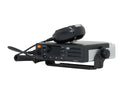
Two-Way Radio Etiquette Your Team Should Know
, by Joseph Gabriel, 2 min reading time

, by Joseph Gabriel, 2 min reading time

Does your business practice safe, effective, and professional communication when operating radio devices? Here are three rules for two-way radio etiquette that your team should know.
All two-way radio operators must understand and follow the “golden four” rules when communicating with one another—clarity, simplicity, brevity, and security. First and foremost, clarity is vital when talking through two-way radios. Speak in a slow, clear, and normal tone to avoid any audio miscues. Concerning “simplicity” and “brevity,” always keep your on-radio communications brief and straightforward. Finally, never disclose or transmit secure or confidential information when using your two-way radio, as many devices share frequencies outside of your business. Following these “golden four” rules are imperative for improving efficiency when communicating over two-way radios.
The phonetic alphabet is a helpful communication tool while operating a two-way radio to clarify audio miscues. This tool makes distinctions between letters and words that sound similar, such as “F” and “S” or “M” and “N.” The phonetic alphabet assigns a specific term for all 26 English letters emphasizing that letters have distinct phonetic sounds. For example, Mike represents “M,” while November designates “N.” Here is the official NATO phonetic alphabet:
Aside from the phonetic alphabet, common radio lingo can be a powerful tool when communicating between operators. Various terms like “radio check” and “wilco” can expedite your transmissions to maintain all four of the golden radio rules.
Using official lingo when operating your two-way radios can dramatically improve your business’s sense of professionalism. Here are ten highly useful radio terms your entire team should know:
Encourage your team to learn and fully know two-way radio etiquette to ensure secure, professional, and effective communication throughout your business. You can provide your employees with top-of-line digital mobile radios by discovering our selection of two-way radios at Atlantic Radio Communications!